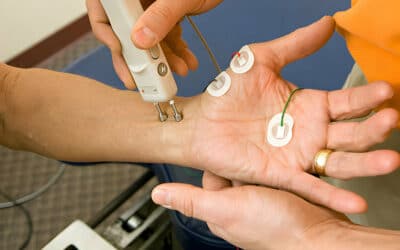Written by Sheri New, Patient Advocate at Space City Pain Specialists
Anyone that has experienced chronic pain or a chronic illness, like fibromyalgia, can tell you that finding a balance between what you need to do, what you can do, and what you should do is like finding the pot of gold at the end of the rainbow. It’s the ever out of reach, constantly shifting idea that we can never quite seem to reach.
I had my first pain flare at 15, and ever since then, I’ve had severe, chronic pain that has gotten worse as I’ve gotten older. At first, the pain was just from time to time, then by the time I had reached my mid 20’s, the pain was daily. At 26, I had a complete hysterectomy due to complications after childbirth. At 33, I was diagnosed with fibromyalgia and chronic, crippling migraines. Fibromyalgia is a chronic pain disorder that causes widespread pain and tenderness in the muscles, tendons, and ligaments across the body. At the time of my fibromyalgia diagnosis, I had three young children and a full-time career. Back then there wasn’t much information about fibromyalgia; therefore, the average person took five years to be diagnosed. By the time I was 41, I could relate to people in their 70’s.
I learned about my diagnosis, but thought I was tough enough to “push through the pain.” I made small accommodations, like regulating my sleep better, modifying my diet, trying low impact exercising, and took the pain medication my doctor had prescribed, but I never stopped long enough to really fully realize how much of an impact my illness and the pain were having on my life.
I measured myself against what I felt I should be able to do; this was usually based off what I used to be able to do, or felt was required of me as a mom and a spouse- as if it were a measure of my self-worth. As if the sum total of what I accomplished in a day somehow meant the pain and illness had not defeated me. I accepted that I would have pain, but did not stop or allow myself to stop long enough to actually learn to really balance my illness.
I faked the heck out of it. For years. Until I couldn’t fake it anymore.
I think it is a common pitfall with chronic illness. We struggle not to be defined by the pain and struggle to maintain our daily lives – while working to maintain our relationships, to work, to live our lives as normally as possible. We are stubborn about our pain and health, and often only stop when the pain doesn’t allow us to go anymore. That stubbornness is often critical to psychologically surviving chronic illness. Without that stubbornness, giving up is too easy of an option- so we cling to it. It’s what gets us out of bed in the morning when we know before we get out of bed that today will be miserable and if we are lucky maybe we will get 25% of what we need to get done for the day.
But what I failed to recognize was that it is just important to allow myself to stop sometimes. I failed to stop before the pain made me unable to walk or move. I failed to realize that taking a day off isn’t me being “lazy,” it’s realizing my body’s limitations and taking care of myself. I failed to realize that sometimes I need to let go of stubbornness and take that day on the couch reading a book or napping is necessary. It’s not selfish, and it does not diminish my self-worth.
Sometimes that means canceling lunch dates with friends, sometimes it means the dishes don’t get done, and that’s OK! Friends who truly care about your health will understand, and the dishes will be there tomorrow for you to do. It was also time to start teaching my children that they can help out around the house with the dishes and laundry. These were skills that I should be teaching them anyway, whether I was chronically ill or not.
Self-care means something different to everybody, but what is not different is our need for it. This goes for everyone, not just patients with a chronic illness or chronic pain. The need for self-care often increases when we can least afford to take the time for it. There are times when we feel like we can’t stop to take care of ourselves, and sometimes we get into such a cycle of not stopping, not taking that time, that we forget how to.
At 51, I received a complex regional pain syndrome diagnosis. This syndrome made fibromyalgia seem like “a walk in the park.” This syndrome has signs and symptoms that could actually be seen and felt, such as chronic arm and leg pain, swelling, changes in skin color and temperature, and muscle spasms and tremors. I remember actually being grateful that people could now see some of my symptoms. I had never heard of this syndrome before, and I had a lot to learn.
At 52, I was subsequently told by my heart specialist that my chronic, uncontrolled pain levels are causing high blood pressure and are the culprit behind my increased, rapid heart rate, which left to continue will become a heart problem. I consequently had a TIA stroke (transient ischemic attack), or mini-stroke, and I spent a few days in the hospital. This was my wake-up call. My father died of a heart attack at age 30; I should have known better.
The combination of being told these things, left my mind reeling, and I developed anxiety. So, I went to my pain management doctor and asked for anxiety medication. Unfortunately, we live in a society where we think that a pill can “fix” anything. He gave me the best advice that I think I have ever received from a doctor. He said, “there is no pill that can fix this.” He pointed to his head and said, “95% of this is how you deal with it in your head.” He was right.
I was told repeatedly upon my fibromyalgia diagnosis, “It’s not terminal, but it is degenerative.” What nobody told me was that if I didn’t allow myself that time to rest when I needed, and learn to balance out my pain and other symptoms, I was propelling myself towards more and more painful health issues.
Nobody told me, “Be kind to yourself.”
We can only “fake it till we make it” for so long before we break. I taught myself that emotional pain would only worsen my physical pain. So, if I felt like crying, I would allow myself a good cry just to get it out. Then, I’d pick myself up and I continue to fight.
However, now I fight now to learn my balances better, to be better at taking care of myself, (which in turn enables me to take care of my loved ones better.), to not hold myself up to unrealistically high standards in order to be “useful” or “normal,” and to recognize the value of what I bring to those in my life, my family, friends, and the people that I advocate for, without feeling the need to constantly be pushing myself beyond what is practical.
Be stubborn. Be strong. Don’t ever give up. Always do your best to listen to your body. Be kind to yourself.



